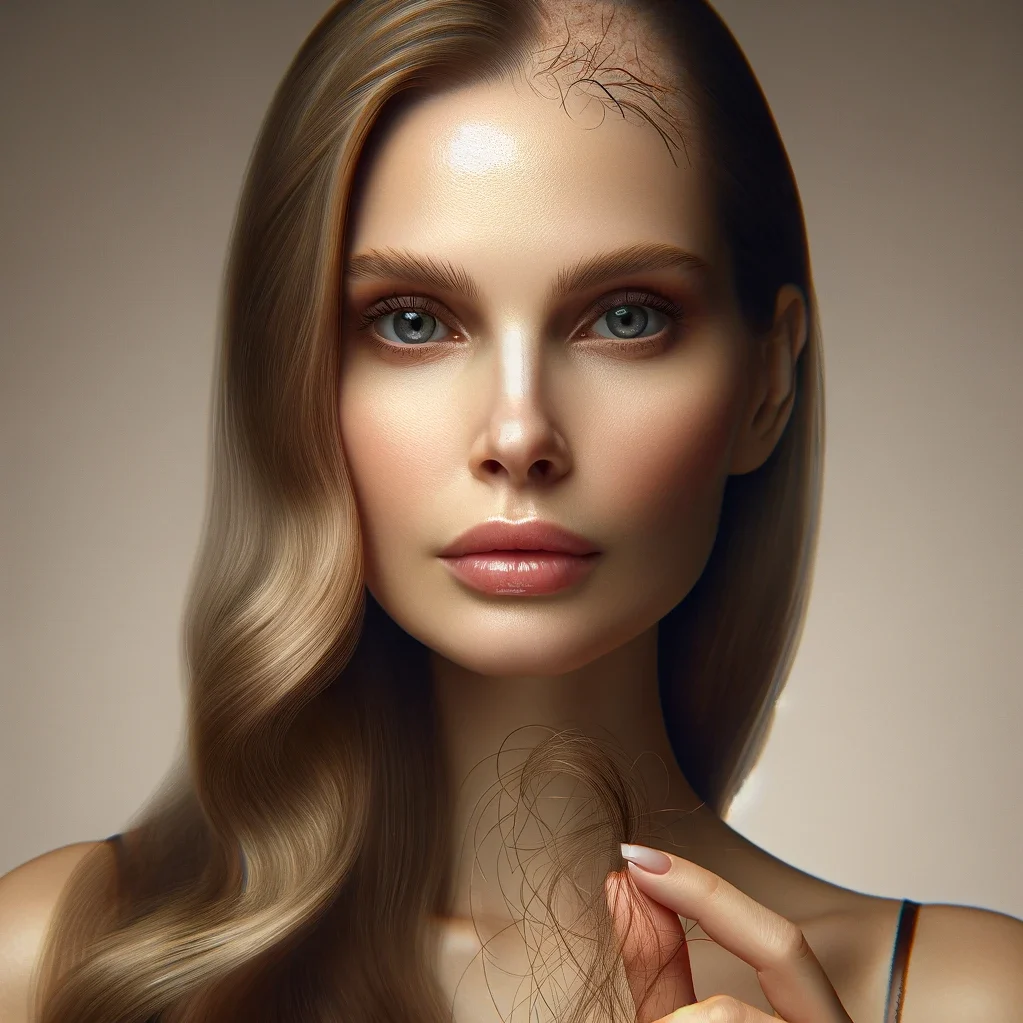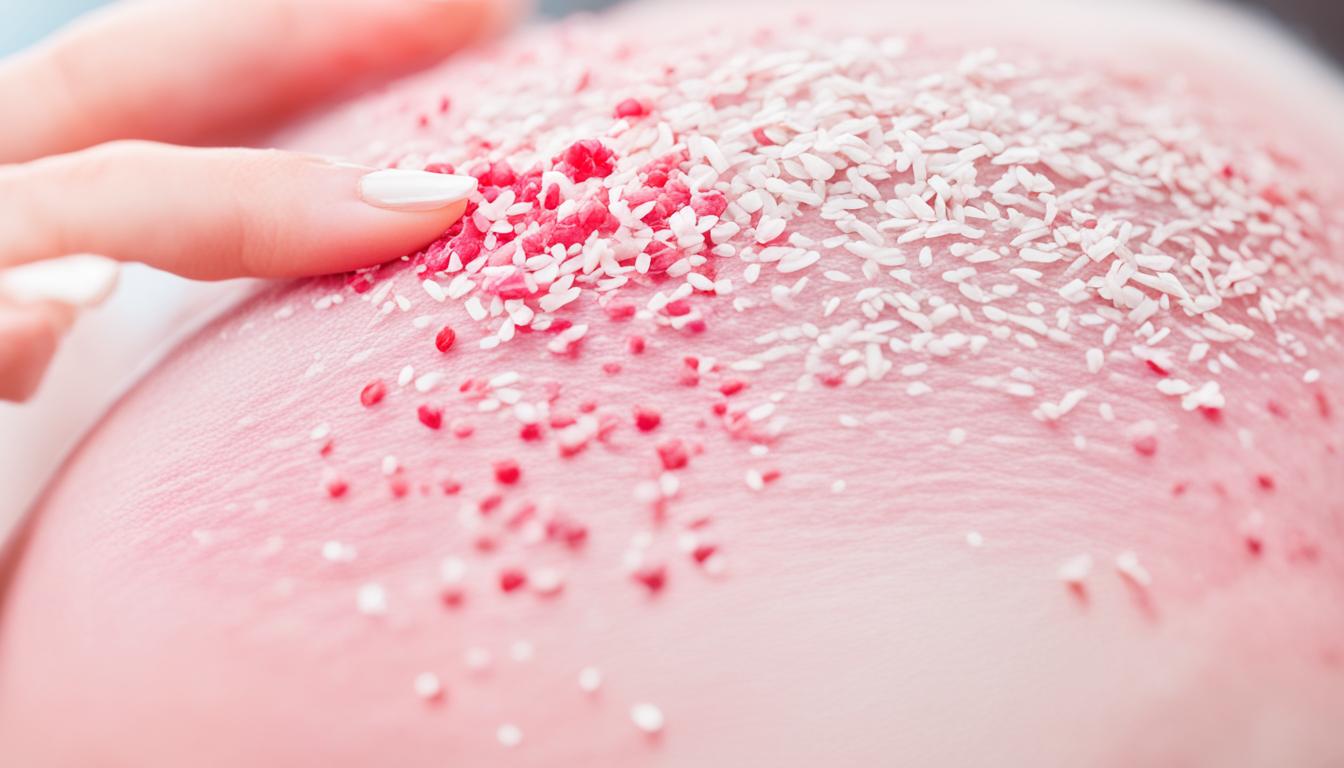Welcome to our comprehensive guide on the causes and solutions for itchy head and hair loss. If you’ve been experiencing scalp irritation, hair thinning, scalp discomfort, excessive hair shedding, or itchy scalp, you’re not alone. These symptoms often indicate a common underlying issue or a causal relationship between scalp itching and hair loss.
There are various factors that can contribute to itchy scalp and hair loss. Fungal infections, allergic reactions, and inflamed hair follicles can all cause scalp itching while also leading to hair loss. It’s important to note that severe itching due to scratching can damage the scalp and hair follicles, resulting in temporary hair loss.
However, it’s not always the case that hair loss accompanies scalp itching. Conditions like hereditary hair loss can cause hair thinning without any associated scalp discomfort. Understanding the underlying causes of itchy scalp and hair loss is crucial in order to find effective solutions and prevent further hair fall.
Key Takeaways:
- Itchy scalp and hair loss often have a common cause or a causal relationship.
- Fungal infections, allergic reactions, and inflamed hair follicles can lead to both scalp itching and hair loss.
- Severe itching due to scratching can damage the scalp and hair follicles, resulting in temporary hair loss.
- Conditions like hereditary hair loss can cause hair loss without scalp itching.
- Understanding the underlying causes is crucial for finding effective solutions and preventing further hair loss.
Common Causes of Itchy Scalp and Hair Loss
Several conditions and factors can contribute to both an itchy scalp and hair loss. Understanding these common causes is crucial for identifying the root cause of scalp itching and hair loss. Let’s explore some of the most prevalent factors:
1. Scalp Ringworm
Scalp ringworm, also known as tinea capitis, is a fungal infection that affects the scalp. This infection weakens the hair follicles, leading to hair loss. Itchy scalp and red, circular patches are common symptoms of scalp ringworm. Prompt treatment is essential to prevent the infection from spreading further.
2. Allergic Reactions
Allergic reactions to hair products can cause scalp itching and hair loss. Ingredients such as fragrances, preservatives, and dyes can trigger allergic responses in some individuals. It’s crucial to identify and avoid the allergens to alleviate scalp discomfort and prevent hair loss.
3. Folliculitis
Folliculitis is an inflammation of the hair follicles, often caused by bacterial or fungal infections. This condition can lead to itching, redness, and pustules on the scalp, contributing to hair loss. Proper hygiene and treatment are essential for managing folliculitis and preventing further complications.
4. Lichen Planopilaris
Lichen planopilaris is an autoimmune condition characterized by the inflammation and destruction of hair follicles. Itchy scalp, redness, and scarring are common symptoms of this condition. Lichen planopilaris can result in permanent hair loss if not properly addressed.
5. Scalp Psoriasis
Scalp psoriasis is a chronic autoimmune disorder that causes red, scaly patches on the scalp. In addition to discomfort and itchiness, this condition can lead to hair loss due to the inflammation of the scalp. Proper management and treatment are essential for minimizing symptoms and preserving scalp health.
6. Dandruff
Dandruff is a common scalp condition characterized by flaking, itching, and inflammation. While dandruff itself does not cause hair loss, excessive scratching of the scalp can weaken the hair follicles and lead to temporary hair loss. Effective dandruff control is crucial to alleviate itching and maintain a healthy scalp environment.
By understanding these common causes, you can take the necessary steps to address and manage scalp itching and hair loss effectively. Consult a healthcare professional or dermatologist for a proper diagnosis and personalized treatment plan based on your specific condition.
| Cause | Symptoms | Treatment |
|---|---|---|
| Scalp Ringworm | Itchy scalp, red circular patches, hair loss | Antifungal medications |
| Allergic Reactions | Scalp itching, hair loss, skin inflammation | Avoidance of allergens, topical creams |
| Folliculitis | Itchy scalp, pustules, hair loss | Antibiotics, antifungal medications, healthy scalp hygiene |
| Lichen Planopilaris | Itchy scalp, redness, scarring, hair loss | Topical corticosteroids, immunotherapy, anti-inflammatory medications |
| Scalp Psoriasis | Scaly patches, itching, hair loss | Topical corticosteroids, moisturizers, immunotherapy |
| Dandruff | Flaking, itching, scalp inflammation | Medicated shampoos, scalp treatments, anti-dandruff products |
Treating Itchy Scalp and Hair Loss
Treating itchy scalp and hair loss requires addressing the underlying cause. It is essential to identify the specific condition or factor contributing to scalp itching and hair thinning in order to implement an effective treatment plan. There are various treatment options available, including medicated shampoos, topical creams, natural remedies, and medications prescribed by healthcare professionals.
Medicated Shampoos
Medicated shampoos can provide relief for scalp itching and help improve hair health. Some medicated shampoos contain key ingredients such as zinc or selenium, which have anti-inflammatory and antifungal properties to combat dandruff, fungal infections, and other scalp conditions. Regular use of these shampoos can help alleviate symptoms and promote a healthy scalp environment.
Topical Creams and Medications
In cases where the underlying cause of scalp itching and hair loss is a specific fungal infection, allergic reaction, or folliculitis, topical creams or medications may be prescribed by a healthcare professional. Antifungal creams, allergy creams, and antibiotics can effectively target the root cause and provide relief from both itching and hair loss.
Natural Remedies and Essential Oils
Natural remedies can also play a role in treating itchy scalp and hair loss. Essential oils such as tea tree oil, lavender oil, and rosemary oil have antimicrobial and soothing properties that can help alleviate scalp itching and promote hair growth. These essential oils can be diluted and applied topically or added to shampoo for enhanced effectiveness. Additionally, maintaining a healthy diet rich in essential nutrients like vitamins A, C, and E, and minerals like zinc can support scalp and hair health.
“Treating itchy scalp and hair loss involves a multi-faceted approach that addresses both the symptoms and the underlying cause. Medicated shampoos, topical creams, and natural remedies can provide relief from scalp itching, promote a healthy scalp environment, and support hair growth.”
| Treatment | Benefits |
|---|---|
| Medicated Shampoos | – Alleviates scalp itching |
| – Helps combat dandruff and fungal infections | |
| Topical Creams and Medications | – Targets specific underlying causes |
| – Provides relief from itching and hair loss | |
| Natural Remedies and Essential Oils | – Soothes scalp irritation |
| – Promotes hair growth |
In conclusion, treating itchy scalp and hair loss involves a combination of medicated shampoos, topical creams, natural remedies, and essential oils. It is important to consult with a healthcare professional for a proper diagnosis and personalized treatment plan. By addressing the underlying cause and implementing effective treatment strategies, scalp itching can be reduced, and hair health can be restored.
Conclusion
Itchy scalp and hair loss can have various causes, including fungal infections, allergic reactions, and inflammatory conditions. Identifying the underlying cause is pivotal in finding effective treatments. Medications, such as topical creams or medicated shampoos, can provide relief from scalp itching and prevent further hair loss.
Maintaining a healthy scalp and hair care routine is crucial in managing these issues. It is important to avoid triggers that may worsen scalp discomfort and hair thinning. Nurturing the scalp with essential nutrients, through a balanced diet or supplements, can also contribute to the prevention of these conditions.
If you are experiencing persistent scalp itching or hair loss, it is recommended to consult a healthcare professional for a proper diagnosis and personalized treatment plan. They can help determine the underlying cause and guide you in selecting the most appropriate treatment options for your specific situation.
FAQ
Can an itchy scalp cause hair loss?
Yes, an itchy scalp can lead to hair loss. Itching can be caused by conditions like fungal infections, allergic reactions, or inflamed hair follicles, which can also result in hair loss.
What are some common causes of itchy scalp and hair loss?
Common causes include scalp ringworm, allergic reactions to hair products, folliculitis, lichen planopilaris, scalp psoriasis, and dandruff.
How can itchy scalp and hair loss be treated?
Treatment involves addressing the underlying cause. This may include using medications such as antifungal creams, allergy creams, or antibiotics. Topical corticosteroids or immunotherapy medications may be recommended for inflammatory conditions. Medicated shampoos containing zinc or selenium can help alleviate symptoms of dandruff. Natural remedies like essential oils and a healthy diet can also support scalp and hair health.
What can I do to prevent itchy scalp and hair loss?
Maintaining a healthy scalp and hair care routine, avoiding triggers, and nurturing the scalp with essential nutrients can help prevent scalp discomfort and hair thinning. It is important to consult a healthcare professional for a proper diagnosis and personalized treatment plan.

